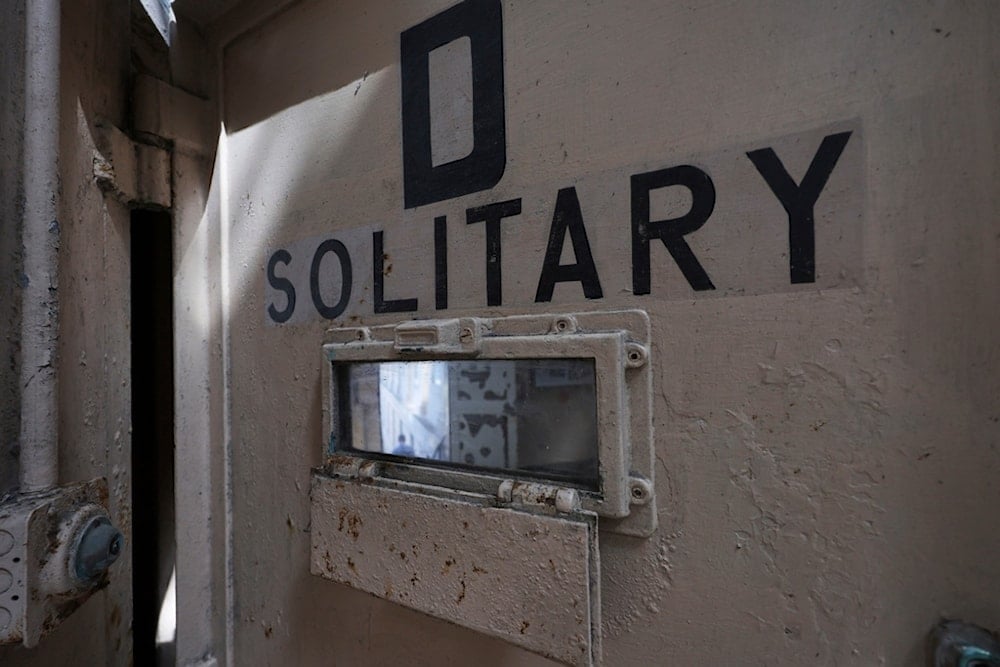Solitary confinement in ICE detention surges under Trump admin.
A new report reveals ICE placed more than 10,500 people in solitary confinement between April 2024 and May 2025.
-

The door to a solitary confinement cell is shown on Alcatraz Island, Monday, May 5, 2025, in San Francisco (AP)
More than 10,500 people were placed in solitary confinement by US Immigration and Customs Enforcement (ICE) between April 2024 and May 2025, according to a new report. The practice has surged in recent months under US President Donald Trump’s administration, raising alarm over its human rights impact.
The report, published by Physicians for Human Rights (PHR), the Peeler Immigration Lab, and Harvard Law School experts, details how US immigration policy has increasingly relied on isolation in detention centers, with vulnerable detainees bearing the heaviest burden.
The United Nations has defined solitary confinement as confinement in small cells with little or no human contact for at least 22 hours a day.
When such placements last more than 15 days, the UN considers it a form of psychological torture.
Read more: ICE access to Israeli Graphite spyware sparks civil rights concerns
Trump immigration policy, detention expansion
The data span the Biden administration and Trump’s return to office but show a sharp rise since January 2025, when Trump enacted his mass deportation agenda and expanded detention facilities.
In Trump’s first four months back in office, solitary confinement grew by an average of 6.5% each month, six times the rate seen during Biden’s final months. Vulnerable detainees, including those with medical or mental health conditions, saw their placements increase by 56% in fiscal year 2025 compared with 2022.
“This is a lot worse than when I first started providing this data in 2021,” said Arevik Avedian, a Harvard Law School lecturer and co-author of the report Cruelty Campaign: Solitary Confinement in US Immigration Detention.
Human rights violations against vulnerable people
The report reveals that people with health or mental health conditions are often held in solitary confinement for twice as long as before.
Researchers described the worsening conditions as a violation of human rights standards, despite ICE guidelines to restrict isolation for vulnerable groups.
Katherine Peeler, medical adviser with PHR, warned, “This system is already characterized by torturous conditions, and the expansion of resources without oversight is creating catastrophic human rights violations.”
Read more: Trump administration to push UN to restrict global asylum rights
Record arrests, deportations in US
Since January 2025, ICE and Customs and Border Protection have arrested more than 210,000 people and deported over 216,000, per data acquired from the two bodies and later published by The Guardian. The number of people in detention reached nearly 60,000 by September, a record high in the United States.
Trump’s “big, beautiful bill,” signed in July, allocated $170 billion for immigration and border operations, making ICE the largest federally funded law enforcement agency.
The analysis also examined facilities in New England, where nearly three-quarters of solitary confinement placements lasted 15 days or longer. On average, detainees were kept in isolation for a month.
Investigators found systemic use of solitary confinement for arbitrary or retaliatory purposes, including punishing detainees who filed grievances, reported sexual assault, or requested basic necessities such as showers.
Long-term psychological consequences
The UN has warned that solitary confinement causes “severe and often irreparable psychological and physical consequences,” including PTSD, hallucinations, brain damage, and increased suicide risk.
The case of Charles Leo Daniel, a 61-year-old from Trinidad and Tobago who died in ICE custody in 2024 after more than 13 years in isolation, underscores the dangers. He spent his final four years in solitary confinement before dying of cardiovascular disease.
The report concludes with recommendations urging policymakers to end the use of solitary confinement and halt the expansion of detention centers under the current US immigration policy.
“These are people coming to our country seeking help, contributing to our economy, and living alongside us,” Peeler said. “It’s important to recognize their humanity and treat them accordingly.”

 4 Min Read
4 Min Read









